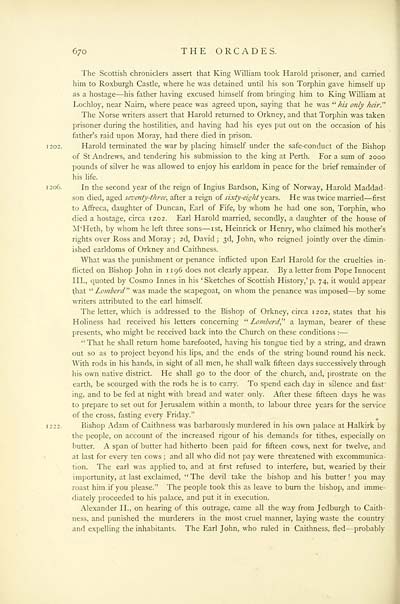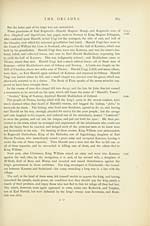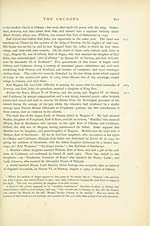Family records of the Bruces and the Cumyns
(690) Page 670
Download files
Complete book:
Individual page:
Thumbnail gallery: Grid view | List view

670 THE ORCADES.
The Scottish chroniclers assert that King William took Harold prisoner, and carried
him to Roxburgh Castle, where he was detained until his son Torphin gave himself up
as a hostage — his father having excused himself from bringing him to King William at
Lochloy, near Nairn, where peace was agreed upon, saying that he was " his only heir."
The Norse writers assert that Harold returned to Orkney, and that Torphin was taken
prisoner during the hostilities, and having had his eyes put out on the occasion of his
father's raid upon Moray, had there died in prison.
r2o2. Harold terminated the war by placing himself under the safe-conduct of the Bishop
of St Andrews, and tendering his submission to the king at Perth. For a sum of 2000
pounds of silver he was allowed to enjoy his earldom in peace for the brief remainder of
his life.
1206. In the second year of the reign of Ingius Bardson, King of Norway, Harold Maddad-
son died, aged seventy-three, after a reign of sixty-eight years. He was twice married — first
to Affreca, daughter of Duncan, Earl of Fife, by whom he had one son, Torphin, who
died a hostage, circa 1202. Earl Harold married, secondly, a daughter of the house of
M'Heth, by whom he left three sons — 1st, Heinrick or Henry, who claimed his mother's
rights over Ross and Moray ; 2d, David ; 3d, John, who reigned jointly over the dimin-
ished earldoms of Orkney and Caithness.
What was the punishment or penance inflicted upon Earl Harold for the cruelties in-
flicted on Bishop John in 1 196 does not clearly appear. By a letter from Pope Innocent
III., quoted by Cosmo Innes in his 'Sketches of Scottish History,' p. 74, it would appear
that " Lomberd" was made the scapegoat, on whom the penance was imposed — by some
writers attributed to the earl himself.
The letter, which is addressed to the Bishop of Orkney, circa 1202, states that his
Holiness had received his letters concerning "Lomberd" a layman, bearer of these
presents, who might be received back into the Church on these conditions : —
" That he shall return home barefooted, having his tongue tied by a string, and drawn
out so as to project beyond his lips, and the ends of the string bound round his neck.
With rods in his hands, in sight of all men, he shall walk fifteen days successively through
his own native district. He shall go to the door of the church, and, prostrate on the
earth, be scourged with the rods he is to carry. To spend each day in silence and fast"
ing, and to be fed at night with bread and water only. After these fifteen days he was
to prepare to set out for Jerusalem within a month, to labour three years for the service
of the cross, fasting every Friday."
1222. Bishop Adam of Caithness was barbarously murdered in his own palace at Halkirk by
the people, on account of the increased rigour of his demands for tithes, especially on
butter. A span of butter had hitherto been paid for fifteen cows, next for twelve, and
at last for every ten cows ; and all who did not pay were threatened with excommunica-
tion. The earl was applied to, and at first refused to interfere, but, wearied by their
importunity, at last exclaimed, "The devil take the bishop and his butter! you may
roast him if you please." The people took this as leave to burn the bishop, and imme-
diately proceeded to his palace, and put it in execution.
Alexander II., on hearing of this outrage, came all the way from Jedburgh to Caith-
ness, and punished the murderers in the most cruel manner, laying waste the country
and expelling the inhabitants. The Earl John, who ruled in Caithness, fled — probably
The Scottish chroniclers assert that King William took Harold prisoner, and carried
him to Roxburgh Castle, where he was detained until his son Torphin gave himself up
as a hostage — his father having excused himself from bringing him to King William at
Lochloy, near Nairn, where peace was agreed upon, saying that he was " his only heir."
The Norse writers assert that Harold returned to Orkney, and that Torphin was taken
prisoner during the hostilities, and having had his eyes put out on the occasion of his
father's raid upon Moray, had there died in prison.
r2o2. Harold terminated the war by placing himself under the safe-conduct of the Bishop
of St Andrews, and tendering his submission to the king at Perth. For a sum of 2000
pounds of silver he was allowed to enjoy his earldom in peace for the brief remainder of
his life.
1206. In the second year of the reign of Ingius Bardson, King of Norway, Harold Maddad-
son died, aged seventy-three, after a reign of sixty-eight years. He was twice married — first
to Affreca, daughter of Duncan, Earl of Fife, by whom he had one son, Torphin, who
died a hostage, circa 1202. Earl Harold married, secondly, a daughter of the house of
M'Heth, by whom he left three sons — 1st, Heinrick or Henry, who claimed his mother's
rights over Ross and Moray ; 2d, David ; 3d, John, who reigned jointly over the dimin-
ished earldoms of Orkney and Caithness.
What was the punishment or penance inflicted upon Earl Harold for the cruelties in-
flicted on Bishop John in 1 196 does not clearly appear. By a letter from Pope Innocent
III., quoted by Cosmo Innes in his 'Sketches of Scottish History,' p. 74, it would appear
that " Lomberd" was made the scapegoat, on whom the penance was imposed — by some
writers attributed to the earl himself.
The letter, which is addressed to the Bishop of Orkney, circa 1202, states that his
Holiness had received his letters concerning "Lomberd" a layman, bearer of these
presents, who might be received back into the Church on these conditions : —
" That he shall return home barefooted, having his tongue tied by a string, and drawn
out so as to project beyond his lips, and the ends of the string bound round his neck.
With rods in his hands, in sight of all men, he shall walk fifteen days successively through
his own native district. He shall go to the door of the church, and, prostrate on the
earth, be scourged with the rods he is to carry. To spend each day in silence and fast"
ing, and to be fed at night with bread and water only. After these fifteen days he was
to prepare to set out for Jerusalem within a month, to labour three years for the service
of the cross, fasting every Friday."
1222. Bishop Adam of Caithness was barbarously murdered in his own palace at Halkirk by
the people, on account of the increased rigour of his demands for tithes, especially on
butter. A span of butter had hitherto been paid for fifteen cows, next for twelve, and
at last for every ten cows ; and all who did not pay were threatened with excommunica-
tion. The earl was applied to, and at first refused to interfere, but, wearied by their
importunity, at last exclaimed, "The devil take the bishop and his butter! you may
roast him if you please." The people took this as leave to burn the bishop, and imme-
diately proceeded to his palace, and put it in execution.
Alexander II., on hearing of this outrage, came all the way from Jedburgh to Caith-
ness, and punished the murderers in the most cruel manner, laying waste the country
and expelling the inhabitants. The Earl John, who ruled in Caithness, fled — probably
Set display mode to:
![]() Universal Viewer |
Universal Viewer | ![]() Mirador |
Large image | Transcription
Mirador |
Large image | Transcription
Images and transcriptions on this page, including medium image downloads, may be used under the Creative Commons Attribution 4.0 International Licence unless otherwise stated. ![]()
| Histories of Scottish families > Family records of the Bruces and the Cumyns > (690) Page 670 |
|---|
| Permanent URL | https://digital.nls.uk/95079266 |
|---|
| Description | A selection of almost 400 printed items relating to the history of Scottish families, mostly dating from the 19th and early 20th centuries. Includes memoirs, genealogies and clan histories, with a few produced by emigrant families. The earliest family history goes back to AD 916. |
|---|

